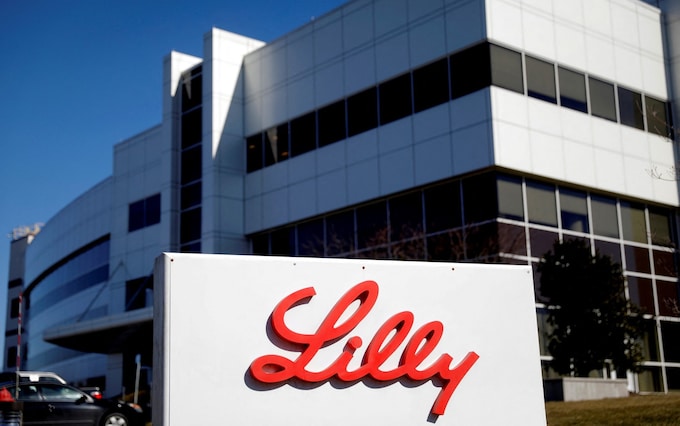
Big pharma strikes blow to NHS patients’ hopes of getting breakthrough drugs
Two major medical companies pull out of Britain’s official pricing scheme at a time of soaring demand for treatment

NHS patients risk missing out on breakthrough drug treatments after two leading pharmaceutical companies pulled out of the UK’s official pricing scheme.
Eli Lilly and AbbVie have left the voluntary scheme for branded medicines pricing and access (VPAS), a long-standing agreement between the Government, NHS and medicine manufacturers designed to limit the cost of drugs for the health service while supporting industry innovation.
The scheme caps the health service’s branded medicines bill, meaning that all drug manufacturers face a charge if the bill rises more than two per cent annually.
The cost of that charge has risen rapidly in recent years as demand for NHS treatment has grown. As of Dec 2022, the payback rate was set at 26.5 per cent.
Before the pandemic, the rate was about five per cent.
Charges put UK ‘out of step’ with the world
The Association of the British Pharmaceutical Industry (ABPI), the medicines trade body, said the increase puts the UK “out of step” with global competitors, with European countries such as Germany having rates of just nine per cent.
It came after the Government launched its 10-year “Life Sciences Vision” in 2021 to “accelerate the delivery of life-changing innovations to patients” and make the UK a “science superpower”.
However, pharmaceutical companies said that the “punishing” charges are forcing them to reduce their footprint, research and development, and manufacturing investments in the UK.
Meanwhile, the number of clinical trials initiated in the UK every year fell by more than two-fifths between 2017 and 2021.
ABPI and its members said that the level will have further impacts on patients’ access to new and innovative drugs.
Dr Richard Torbett, the chief executive at the ABPI, said that demand for new medicines has grown “much faster than industry pre-pandemic projections – driving up the repayment rates far beyond sustainable levels” owing to the record backlog of patients waiting for NHS treatment.
Companies face higher repayment rates
The current VPAS deal, set in 2019, means that “despite demand for branded medicines rising sharply, driven by clinical decisions and patient need, the money spent on them has declined by 14 per cent in real terms over the last decade”, he added.
Because of the clawback rate, Eli Lilly and AbbVie are the first companies to leave the scheme, which has seen its membership steadily increase in recent years.
They will instead come under the alternative statutory scheme which is imposed by Government through law, not via negotiation, and typically carries higher repayment rates.
Their decision to leave, and face the potentially higher charges, demonstrates the “depth of feeling” over the failures of VPAS, the ABPI said.
VPAS is due to end in December this year and the ABPI is seeking early talks with the Government to agree a new future settlement which “captures the huge potential of the life sciences sector”.
It is understood that Will Quince, the health minister, is holding roundtable talks with the industry to discuss the impact of VPAS on the commercial environment.
Voluntary scheme ‘harmed innovation’
Eli Lilly, which has operated in the UK since the Forties, said that VPAS has “harmed innovation” in the UK and will turn it into a “global outlier”.
Last year, the pharmaceutical giant secured approval for tirzepatide, a weight-loss drug for diabetes patients. It is currently seeking authorisation from the National Institute for Health and Care Excellence to roll it out on the NHS.
However, its shock exit from the scheme raises questions about how rapidly such innovative treatments will be made available to patients, if firms feel deterred from investing in the UK.
Laura Steele, Eli Lilly’s president and general manager for northern Europe, said: “We simply cannot stay signed up to a scheme which has such a punishing impact on innovation.
“We want to see action on a new settlement that allows life sciences to thrive in the UK now and over the long-term, to boost investment in the UK and ensure patients here can benefit rapidly from cutting-edge clinical trials and medicines.”
Detrimental impact to medical research
Todd Manning, the general manager of AbbVie UK – which is currently manufacturing innovative drugs for lung cancer and inflammatory bowel disease – said that its decision to leave VPAS was not taken lightly and that the revenue clawbacks had a “demonstrable impact on our ability to operate sustainably in the UK”.
He added: “Without a positive signal that the future scheme will deliver more reasonable rates, I fear it will be increasingly difficult to advocate for the UK and what I believe is our shared ambition of securing investment, jobs and, ultimately, delivering improved health outcomes for UK patients.”
Dr Torbett said: “We have already seen the UK lose almost half of its global share of R&D over the past decade. For this trend to be reversed, we must develop a more internationally competitive scheme with the Government that can genuinely support the life sciences vision.”
A Department of Health and Social Care spokesman said that VPAS allows companies to freely leave and join the statutory scheme.
“The NHS has delivered a record number of access agreements since VPAS was agreed – including many world and European-first agreements,” they said.
“We are open to ideas about how the next scheme should operate, after the current agreement runs out at the end of 2023, and will continue to engage with industry to understand the impact on companies.”